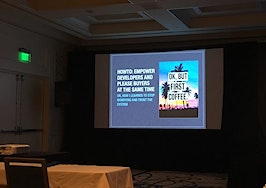- "Focus on real value, not sales techniques. If you do this, your next decade in business will be beyond your wildest dreams."
SAN FRANCISCO — In the 1980s, American automakers were so obsessed with sales that Chrysler built a series of vehicles on a new platform, the K-car platform. “It was one of the worst examples of design engineering and manufacturing ever, and Chrysler knew it, yet they just focused on selling it regardless,” said James Becker on stage at Inman Connect San Francisco.

James Becker
He also noted that this is a cautionary tale for the real estate industry. “Detroit sold subpar products because generally they were the only choice the American consumers had at the time,” he added, “and all the while, the Japanese automakers focused on the long game — quality and value.”
Anyone remember what happened after that? Eventually, those Japanese car brands started to make inroads into the market. “American automakers so abused American consumers’ faith that they suffered significant losses in market share that they have never regained,” Becker said.
The six-figure fallacy
“Most agents that I talk with seem to have a confidence that once they hit a solid six-figure income, they are over the hump and it is smooth sailing from then on when it comes to growth,” Becker said. “They think that they’ll get more repeat business and referrals if they keep working with more clients” — and that just makes logical sense, he added.
But Becker doesn’t think that reality bears out this confidence. “About 10 years ago, I noticed that it seemed like the opposite was true: The longer most agents were in business, after a period of time, their businesses would begin to shrink.”
After thinking about this for a while, he decided to use his company, Fusion Growth Partners, to see if what he noticed was actually happening. “We went back 10 years and out of a pool of 12,000 agents from a middle market, we pulled every single agent who was earning $100,000 to $250,000 in gross commission incomes. What the research showed was not good news.”
Becker said that after 10 years, 75 percent of those high-producing agents were either out of business entirely or earning less. They pulled the same data from the past five years and saw that about half of the top-producing agents from five years ago were also either out of business or earning less.
“How is it possible that most good-producing agents’ businesses get worse with time? With more experience, more past clients and larger networks?” he asked.
What game do you want to play?
Becker thinks that this loss of top-producing talent is a result of playing a short game instead of a long one, “not unlike an alcoholic or drug addict who chooses to get high instead of doing the long, hard, challenging work of getting sober.”
And this is his intervention to the real estate industry.
“I see the same parallel in real estate today,” he said. “We focus on selling versus the value that we give to clients, and the leaders and agents are equally culpable in this behavior.”
He shared a tale of a newly licensed agent who’d signed up with a big, well-respected broker and was giving him details about her training.
“She told me she was being taught scrips and dialogues and how to express herself with her hands in a way that would allow her to be trusted by her prospects,” he said. “I asked her how much time she’d spent on contract knowledge, property design, how to negotiate an agreement or anything else besides sales techniques.”
Her response? “I’ll learn that once I get a client.”
“In this industry, we often teach and encourage agents to be a facade of a trusted professional instead of actually being a trusted professional,” he noted. “She knows she’s not knowledgable, her manager knows it and her broker knows it, but she’s going out trying to get clients.”
The short game vs. the long game
“The growth advice agents get is almost always the short game,” Becker opined.
This includes advice to generate more leads, engage more in prospecting, go door-knocking or work on other sales activities. “The attention to the sales process is over the top,” Becker said.
“Our market and our world is changing faster than ever. The protection we had from outsiders is lost forever. We have monstrous businesses that are now looking to compete for a piece of our pie, and they’re all here to stay,” he added. “These companies to some of you are what the Japanese automakers were to the American automakers in the 1980s. These companies are investing substantial amounts of time, money and energy to take your clients. What are you going to do about it?”
Becker suggests taking age-old advice to “build a better mousetrap” so the world will beat a path to your door. “That means, provide more value,” he explained. “A lot more value. Focusing on delivering value that separates you from all the other competitors is going to be critical to your future growth, maybe even your survival.”
That’s not an adjective that a short-sighted agent can claim. “There is always going to be a market for real value, but those agents who provide a facade of full service — I think you’re going to get eaten alive by the tech giants,” he said.
“They’re going to be able to market and provide crappy, low-level service far better than you will be able to do, and you will lose the race to the bottom. But for those who focus on real value, true value, who are racing to the top, they will stand out and be sought-after by many, many consumers.”
So what to do?
There are agents in many markets that are providing value and doing it well — so start by looking at your competitors, examining the added value they bring their clients and then add it to your own portfolio.
And be willing to do the work that you’ll need to put in to be successful, because it’s not as simple as increasing your ad spend.
Becker shared a saying that he saw a few months back. “It said, ‘Your heart does not just beat for you.'”
He considered the different people who his heart beats for — his kids, his wife, his friends and family — and then wondered whether he could claim ownership over his own heart. That’s a good thing!
“That means that I must belong here and have a purpose, a cause, something that is important to do for those who own my heart, which makes me important and gives me value to others,” he said.
“For entrepreneurs, that also means our businesses are owned by others,” he added. “They’re owned in a sense by our clients and our community, and when that happens, it makes your business important to others. And when others have a sense that it belongs to you for the value that you bring, they will hire and refer your business again and again because in a very real sense, it belongs to them.
“Make friends, serve people, be the agent you would actually hire,” Becker concluded. “Focus on real value, not sales techniques. If you do this, your next decade in business will be beyond your wildest dreams.”












